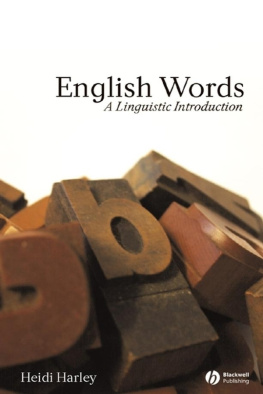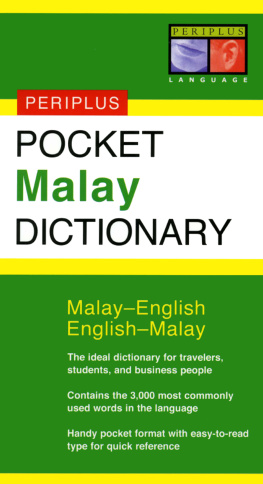The Prodigal Tongue
BOOKS BY MARK ABLEY
SPOKEN HERE
Travels Among Threatened Languages
THE PRODIGAL TONGUE
Dispatches from the Future of English
This eBook is copyright material and must not be copied, reproduced, transferred, distributed, leased, licensed or publicly performed or used in any way except as specifically permitted in writing by the publishers, as allowed under the terms and conditions under which it was purchased or as strictly permitted by applicable copyright law. Any unauthorised distribution or use of this text may be a direct infringement of the author's and publisher's rights and those responsible may be liable in law accordingly.
ISBN 9781407008431
Version 1.0
www.randomhouse.co.uk
Published by William Heinemann, 2008
2 4 6 8 10 9 7 5 3 1
Copyright Mark Abley, 2008
Mark Abley has asserted his right under the Copyright, Designs
and Patents Act, 1988, to be identified as the author of this work
Grateful acknowledgement is made to the following for permission to reprint
previously published material:
Lines from 'Dear Tech Support' and 'Dear Customer' by Shanta Acharya are reprinted by
kind permission of the author.
Lines from Collected Poems by Nissim Ezekiel are reproduced by permission of
Oxford University, University Press India, New Dehli.
This electronic book is sold subject to the condition that it shall not by way of trade or otherwise, be lent, resold, hired out, or otherwise circulated without the publisher's prior consent in any form other than that in which it is published and without a similar condition including this condition being imposed on the subsequent purchaser
First published in the United States in 2008 by Houghton Mifflin Company, New York
First published in Great Britain in 2008 by
William Heinemann
Random House, 20 Vauxhall Bridge Road,
London SW1V 2SA
www.rbooks.co.uk
Addresses for companies within The Random House Group Limited can be found at:
www.randomhouse.co.uk/offices.htm
The Random House Group Limited Reg. No. 954009
A CIP catalogue record for this book
is available from the British Library
ISBN: 9781407008431
Version 1.0
FOR MY DAUGHTERS,
KATE AND MEGAN
Loo! what sholde a man in thyse dayes now wryte, "egges" or"eyren"? Certaynly it is harde to playse every man bycause ofdyversite and chaunge of langage.
WILLIAM CAXTON, prologue to Eneydos (1490)
Each word was at first a stroke of genius... The etymologistfinds the deadest word to have been once a brilliant picture.
Language is fossil poetry.
RALPH WALDO EMERSON, "The Poet"
1
Roarific
The Power of Language Change
WAS I IN ARCADIA OR ALHAMBRA? Was I speeding pastTemple City or City of Industry?Somewhere amid the grind and spurt of traffic on a southernCalifornia freeway, I slipped a Coldplay disc, X&Y, into my car's CD player.The morning sun lit up the distant, snow-clotted San Gabriel Mountains, aprospect as exhilarating as the opening song, "Square One." As the leadsinger, Chris Martin, evoked discovery, travel and the future, his tenor voiceseemed to soar high above the choking swarm of vehicles; half consciouslyI swerved into the fast lane. But Martin's tone soon darkens. Several of thecuts demonstrate loss, regret, uncertainty, and apprehension about whatthe days after tomorrow hold in store for us. An SUV was maintaining anaggressive stance inches behind my license plate, and I pulled back into oneof the middle lanes.
The CD reached its fifth track: a haunting, nine-note melody, repeatedsoftly, then with a surge of percussive volume. Martin sings about his fearof the future, his need to speak out. When an early attempt at reassurancefails, he probes deeper, asking if "you," his brother, feel incomplete or lost.The song is called "Talk." To the underlying rhythm of a drummed heartbeat,its lyrics summon up an anxiety specific to words and meaning:the feeling that other people are addressing him in a language beyond hisgrasp. It's as though language has lost its ability to connect us as thoughwe've misplaced a key that would allow us, somehow, to understand whatwords have come to mean. Birds kept flying somewhere above Walnut orDiamond Bar, but all utterance now seemed strange, unfathomable. Theguitar riffs swooped and rose to match the breathtaking, lethal grandeur ofthe California freeways, yet the song's lyrics were bleak.
Back home in Montreal, I found myself continually listening toX&Y. So were millions of other people in dozens of countries this hadbeen the world's top-selling album in 2005. One day I came across a futuristic,B-movie like video of "Talk"; it showed the perplexed band trying tocommunicate with a giant robot. A version of the video on the You Tubewebsite had been watched more than 442,000 times in the previous tenmonths. Many hundreds of viewers had posted comments. Some of themwere brief, uninhibited love letters. ace this song iz wick id lol ace vid, wrotea viewer from Britain. coldplay is the BEST!! added a thirteen-year-old Finn,using a Japanese screen name. vid. is kind of err. but the song is roarific,noted an American. A comment in English from China followed one inBasque from Spain and one in Spanish from Botswana.
If I were more of a joiner, I might have signed up for the officialColdplay.com online forum, which boasts tens of thousands of members.The forum makes national borders immaterial Latvians and Macedonians,Indonesians and Peruvians, Israelis and Egyptians all belong. Tothem it doesn't matter that the band consists of three Englishmen and aScot singing in a tongue that was once confined to part of an island off Europe'scoast. Now, wherever on the planet these fans happen to live, musicconnects them. So does language. As long as they're willing to grope forwords in the accelerating global language that Coldplay speaks, the forumgives all its members a chance to speak. Which is how the fifth song onX&Y ends. Martin admits that things don't make sense any longer. But asthe melodies collapse around him, he invites us to talk.
All sorts of borders are collapsing now: social, economic, artistic, linguistic.They can't keep up with the speed of our listening, of our speaking,of our singing, of our traveling. Borders could hardly be less relevant onteen-happy websites like Facebook and MySpace. That morning, a Canadianin the exurbs of Los Angeles, I was listening to a British band whiledriving to meet a Mexican-American professor who began a memoir in Argentinafull of sentences like this: "repente veo que ALL OF A SUDDEN,como right out of nowhere, estoy headed for the freeway on-ramp." Routesare merging. Languages are merging.
That professor celebrates a promiscuous, unruly mix of words. Butmany people contemplate such a mix with annoyance and fear, emotionsthey also feel about other kinds of language change, like the chatroom abbreviationsin those You Tube comments. When you first peer at the weirdlyspelled, lowercase fragments of speech, or listen to the staccato interplay oftongues in major cities like LA, you may be fearful that everyone else istalking in a language you don't speak. Is it mere unfamiliarity that inspiressuch unease, or is it something deeper?
Language enables us to feel at home in everyday life. But of late, languageseems to have packed up its bags, slammed the door behind it, andtaken to the open road. That's where we find ourselves: on the move. Everyfew days, if not every few hours, we become aware of a new word or phrasespeeding past us. There's no going back, either no retreat into the grammarand lexicon of the past. Our only home is this: the verbal space inwhich we're already traveling. The expressions in that space are often amazing a generation or two ago, before our use of language went digital, noone would have believed some of what we routinely see, hear and type.










